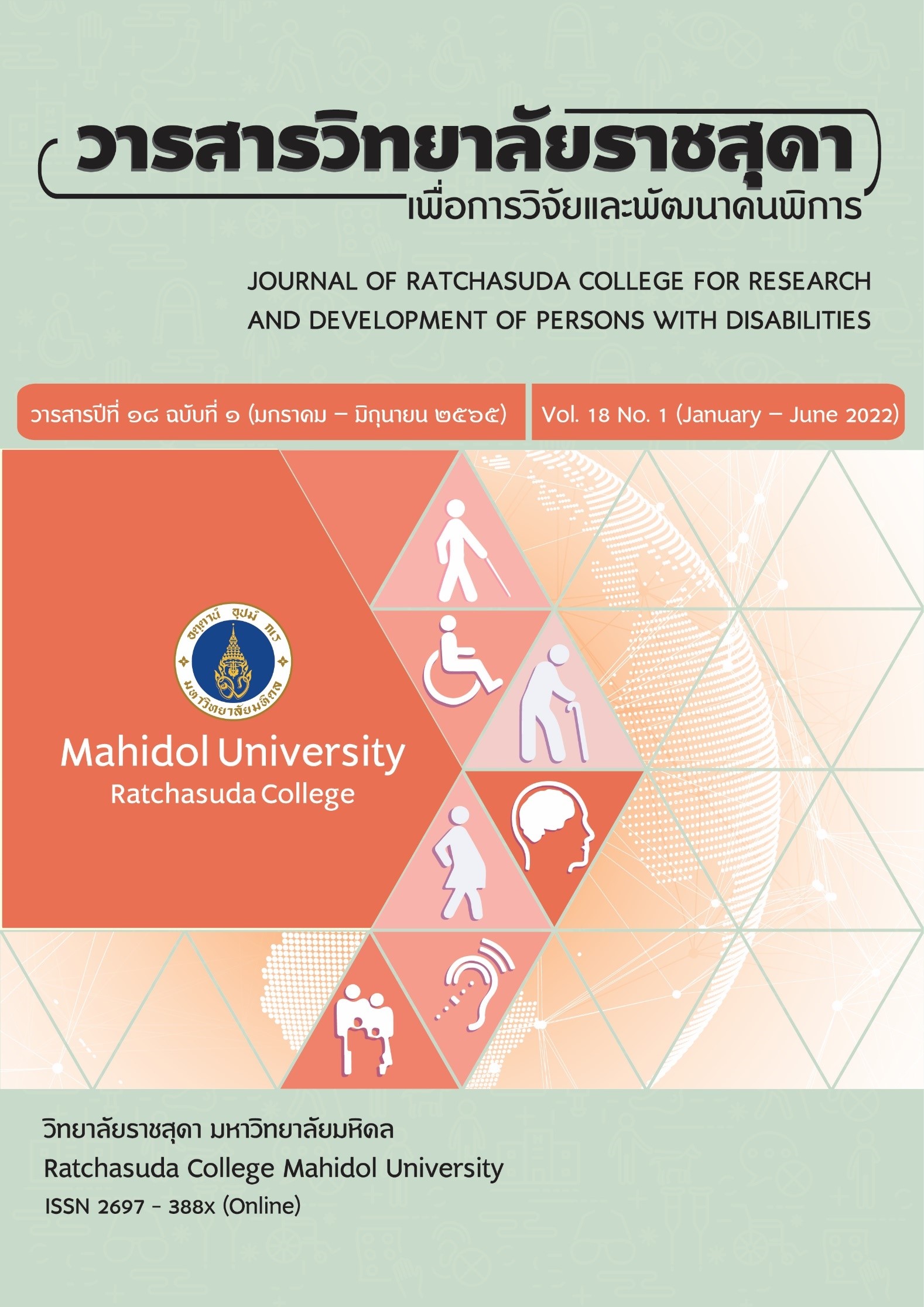Research and Development on Online Lessons in Geography Using Learning Management System for Students with Hearing Impairment in High School
Keywords:
Students with hearing impairment, Online Lessons, Learning Management SystemAbstract
The objective of this study was to research and develop online lessons in geography under the social studies, religion and culture subject area for students with hearing impairment at high school level using a learning management system. This study used research and development methods. The sample groups were 9 experts (3 educational technology experts, 3 content experts, and 3 Thai sign language experts).; 30 online learning informants (15 teachers of students with hearing impairment, and 15 students with hearing impairment).; 37students with hearing impairment for online lessons trial. Methods included 1) developed and quality checked of online lessons; 2) developed and quality checked of pre-post tests; 3) online lesson trial. The pre-post test scores were compared. Students’ feedbacks were also collected. The results were as follows: 1) online lessons consisted of documents, sign language videos with closed captions, pre-post tests, exercises, glossaries, and user manual. 2) results of the online lesson quality assessment by the educational technology and Thai sign language experts were at good level, while the contents experts were at fair level. 3) results of the online lesson quality assessment by students indicated that the post-test scores differed significantly at 0.01 level.
Downloads
References
Adline, A., & Mahalakshmi, G. S. (2011). A novel framework for E-learning content evaluation. In Third international conference on advanced computing (ICoAC), 346–352.
Atchareeyakosol, V. (1993). Evaluation of teaching materials. Journal of Education Studies, Jan-Mar, 1993, 13-29. (In Thai).
BÜchner, A. (2008). Moodle administration: An administrator’s guide to configuring, securing, customizing, and extending Moodle. Bermingham: Packt.
Hertzog, M., Stinson, M. S., & Keiffer, R. (1989). Effect of caption modification and instructor intervention on comprehension of a technical film. Educational Technology Research and Development, 37(2), 59-67.
Hillar, S. P. (2016). Moodle theme development: Build customized theme to make your Moodle course engaging and interactive. Birmingham: Packt.
Howell, J. J., & Luckner, J. L. (2003). Helping one deaf student develop content literacy skills: An action research report. Communication Disorders Quarterly, 25(1), 23-27.
Kent, M. (2017). Opportunities for e-learning, Social Media and Disability. In Ellis, K. & Kent, M. (Eds.). Disability and Social Media Global Perspectives. NY: Routledge.
Kumar, A., Kumar, P., Palvia, S. C. J., & Verma, S. (2017). Online education worldwide: Current status and emerging trends [electronic version]. Journal of Information Technology Case and Application Research, 19(1), 3–9. Retrieved from https://doi.org/10.1080/15228053.2017.1294867.
Luckner, J. L., Sebald, A. M., Cooney, J., Young, J., & Muir, S. G. (2005). An examination of the evidence-based literacy research in deaf education. American Annuals of the deaf, 150(5), 443-456.
McKeown, C. & McKeown, J. (2019). Accessibility in online course: Understanding the Deaf learner. Tech Trend, 63(5), 506-513. Retrieved from https://doi.org/10.1007s11528-019-00385-3.
Meyer, A., Rose, D. H., & Gordon, D. (2014). Universal design for learning: theory and practice. MA: CAST Professional.
Mohd Hashim, M. H. & Tasir, Z. (2020). An e learning environment embedded with sign language videos: research into its usability and the academic performance and learning patterns of deaf students. Education Tech Research Dev, 68: 2873-2977.
Moreno, L., Iglesias, A., Calvo, R., Delgado, S., & Zaragoza, L. (2012). Disability standards and guidelines for learning management systems: Evaluating accessibility. In Babo, R., & Azevedo, A. (Eds.), Higher Education Institutions and Learning Management Systems: Adoption and Standardization. Hershey, PA: IGI Global.
Mtebe, J. S. & Kondoro, A. W. (2016). Using mobile moodle to enhance moodle LMS accessibility and usage at the University of Dar es Salaam. In Cunningham, P., & Cunningham, M. (Eds.). IST-Africa 2016 Conference Proceedings (pp. 1-11).
National Legislative Assembly (2014). Study report on the provision of education for the deaf, Production and service of sign language interpreters. Bangkok: Committee on Social Affairs, Children, Youth, Women, Elderly, Disabled and Disadvantaged. National Legislative Assembly.
Nelson, C. (2016). Continued growth in accessibility of AACSB-accredited online degrees [Blog post]. AACSB International Blog. Retrieved from http://aacsbblogs.typepad.com/ dataandresearch/2016/10/index.htm.
Newport, E. L. (1990). Maturational constraints on language learning. Cognitive Science, 14(1), 11-28.
Nur, A., Wa, L., Fahmi, G., & Mohd Shamsuri, M. S. (2019). The effectiveness of Google Classroom as an instructional media: A case of state Islamic Institute of Kendari, Indonesia. Humanities & Social Sciences Reviews, 7(2), 240-246.
Office of the Basic Education Commission. (2012). Education management plan for persons with disabilities phase 5 years (B.E. 2555-2559). Bangkok: N.P. (In Thai).
Office of the Education Council. (2017). National Education Plan B.E. 2560 – 2579. Bangkok: pricwhangraphic. (In Thai).
Pyfers, L. (2021). Signing books fot the Deaf. Retrieved from https://www.sign-lang.uni-hamburg.de/signingbooks/sbrc/pdf/del_71.pdf.
Ruttanatirakul, A. (2010). Develop e-learning system by moodle complete. Bangkok: V.Print (1991). (In Thai).
Sapp, W. (2009). Universal Design: Online educational media for students with disabilities. Journal of Visual Impairment & Blindness, 103(8), 495-500.
Sathugarn, S. (2007). The development of an appropriate online instruction model for deaf students at higher education level. Journal of Public Health and Development, 5(2), 87-96.
Wongrattana, C. & Naipat, O. (2008). Experimental research patterns and analytical statistics: basic concepts and methods. Bangkok: Chulalongkorn University Press. (In Thai).
Wongwanich, S. & Wiratchai, N. (2003). Guidelines for Thesis Counseling. Bangkok: Center for Textbooks and Academic Documents, Faculty of Education, Chulalongkorn University. (In Thai).
Yoksuriyan, S., Nayong, S., & Leaulamai, S. (2019). Video Format Enhancing Self Learning on Mathematics for Deaf Students in Elementary School. In Adam Neelapaijit, (Chair). The 6th Ratchasuda International Conference on Disability 2019 (pp. 98-111). Organized by Ratchasuda College, Mahidol University. (In Thai).
Yoon, J., & Kim, M. (2011). The effects of captions on deaf students’ content comprehension, cognitive load, and motivation in online learning. American Annuals of the Deaf, 156(3), 283-289.
Downloads
Published
How to Cite
Issue
Section
License
Copyright (c) 2022 JOURNAL OF RATCHASUDA COLLEGE FOR RESEARCH AND DEVELOPMENT OF PERSONS WITH DISABILITIES

This work is licensed under a Creative Commons Attribution-NonCommercial-NoDerivatives 4.0 International License.
บทความที่ได้รับการตีพิมพ์เป็นลิขสิทธิ์ของวารสารสถาบันราชสุดาเพื่อการวิจัยและพัฒนาคนพิการ






